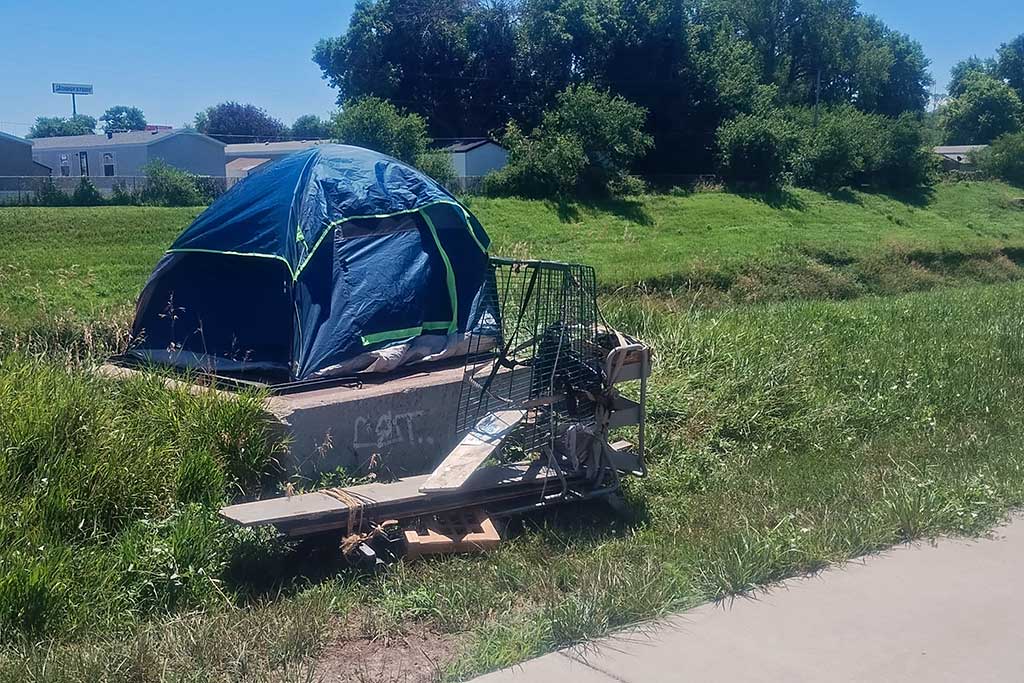Omaha’s growing number of homeless encampments was a hot topic during the recent mayor’s race. Like many issues during a contentious campaign cycle, it sparked more heated political rhetoric than practical solutions.
Recap from the Mayor’s Race
Mike McDonnell addressed the issue directly. In the legislature, he proposed a bill to prohibit tent encampments on certain properties owned by political subdivisions. He also suggested a “FEMA-type approach” for homeless encampments, offering services like showers and mental health support.
These proposals were derided by Jean Stothert. “Mike McDonnell wants to put them in jail or in a camp. That is not what this mayor is gonna do,” Stothert said. John Ewing also criticized McDonnell, stating, “Mike would make homelessness a crime.”
What quickly became the focus of the debate, however, was McDonnell’s criticism of Omaha’s homeless coordinator, whom he described as a “DEI hire” and vowed to fire on day one. After these remarks, accusations of misogyny and concern over hurt feelings took precedence over the homelessness issue itself.
While John Ewing went on to win the mayoral race and Stothert’s homeless coordinator kept her job, tent encampments have continued to appear throughout Omaha. As the winter months loom, the dangers of such living conditions during periods of extreme cold are once again a pressing concern.
Root Causes
Many advocates prefer to use terms like “unsheltered” or “unhoused” rather than “homeless,” and often cite a lack of affordable housing as the root cause.
Sheriff Aaron Hanson disagrees. Speaking at the River City Republicans luncheon in April, he brought up the case of Krysta “Krissy” Gallagher-McMillan, a woman who had publicly opposed McDonnell’s bill. She later died in a tent encampment.
“Everyone’s like, well, just give her a house, and everything would have been fine,” Hanson said. “Guess what? We did — many times. And guess what? Health and Human Services came in. Why? Instead of carpet, there was feces everywhere, drug use, and kids being neglected.” He added that Gallagher-McMillan had given birth to 12 children, all of whom had been removed from her custody. These parts of her story were generally overlooked by the media in coverage of her activism and death.
“She was a victim of her own mental health and addiction—and, I would argue, of a system that does not have ample infrastructure for acute behavioral health and proper case management,” Hanson said. In his 30 years of law enforcement and after encountering hundreds of encampments, he said that over 99.9% of the time, the root cause has been unaddressed behavioral health issues and addiction.
Brinker Harding Takes On the Issue
Removing tent encampments in Omaha will require a new city ordinance. Last week, Councilmember Brinker Harding introduced one that would prohibit unauthorized encampments on public property, such as parks, streets, and sidewalks owned or controlled by the city.
The proposal drew immediate backlash from the Nebraska chapter of the National Association of Social Workers (NASW), which posted on Facebook: “Harding’s proposed ordinance criminalizes homelessness, fining or jailing people for surviving in public spaces under the guise of ‘public safety.’”
This criticism echoes the same rhetoric deployed against McDonnell during the mayoral race. While the ordinance is still in its early stages, only time will tell whether actual solutions will emerge—or whether political posturing will continue to dominate the conversation.




